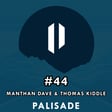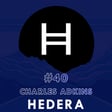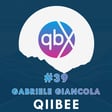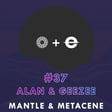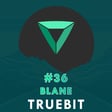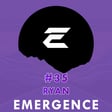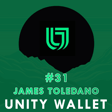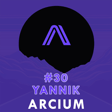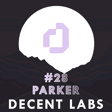Intro
Introduction of Dean and His Journey into Cryptography
00:00:31
cyberpunkmetalhead
Hello, everyone, and welcome to proof of talk. I'm your host, Andre, and I'm here today with Dean, who's the CEO of Agoric. Nice to meet you, Dean, and thanks a lot for accepting my invitation. How are you doing?
00:00:41
Dean _ Agoric
Thank you so much for having me. I'm doing very well. It's great to be here, Andre.
00:00:45
cyberpunkmetalhead
Fantastic. um Well, listen, let me just start and ask you, how did you first get into crypto? It's a question I like to ask my guests, and I always get a different answer, and it's kind of a fun one.
00:00:57
Dean _ Agoric
So it depends what you mean by crypto. um you know
00:01:01
cyberpunkmetalhead
Blockchain like blockchain tech Cryptog
00:01:03
Dean _ Agoric
Well, because I was going to say, I think in 83 or 84, you know, I saw the RSA description and then was talking about it with people at Park and, you know, and where where would this go? and you know And then talking to and grew into cypherpunks. And, you know, and so that's how I got into crypto. But oh
00:01:24
cyberpunkmetalhead
like og cryptography, right?
00:01:26
Dean _ Agoric
ah Blockchain. So 2017, there were, you know, so I knew people that were kind of, you know, interested in Bitcoin and Bitcoin to me was being sold sort of totally the wrong way because it was being represented as sort of the perfect cryptocurrency. And having worked with cyber cash and digicash and all these things that had, you know, fast finality, and not anonymity, you know, untraceability, all these things that you would like in a cash.
00:01:42
cyberpunkmetalhead
Right.
00:01:52
Dean _ Agoric
cry or Bitcoin had none of those. and so you know But people who didn't understand it were misrepresenting
Transition and Initial Skepticism Towards Bitcoin
00:01:57
Dean _ Agoric
And you look at sort of the the the bad software was built on and it really looked like a fly by net kind of operation.
00:02:03
Dean _ Agoric
Um, uh, and so, you know, so, so I wasn't, you know, wasn't very involved in the early blockchain space. Um, we had lots of conversations and lots of work on smart contracts before then, right? I worked on the first production smart contract in 1989 and they really require blockchain, right?
00:02:17
cyberpunkmetalhead
right right
00:02:20
Dean _ Agoric
you know Um, smart contract, you know, pre-blockchain with us and with Nick Szabo and others is, you know, software that's enforcing the terms of a contract like arrangement between third parties. So. trillion dollar market cap before blockchain with Airbnb, Uber, Lyft, eBay, PayPal, Venmo, you know, all these are smart contract businesses enabled by the internet. And that was always fascinating to me, right? So, ETH came out
Ethereum's Promise and Security Issues
00:02:45
Dean _ Agoric
and that was interesting because it was, you know, the thing that that that that Nick had been talking about a lot of sort of autonomous programs that could operate as smart contracts that could help, you know, other people do things.
00:02:57
Dean _ Agoric
But it had these clear sort of fundamental architectural security flaws um you know that we saw in ActionScript of Flash. right And it's the reason why, or a big reason why Flash is no longer around.
00:03:07
cyberpunkmetalhead
right right
00:03:09
Dean _ Agoric
It's just you know synchronous re-endrancy and the the the the security model are just things that humans can't do software at scale with. um You know and you can't do complex software can't do two very well And you know that's borne out with the losses people have gotten and even relatively, you know That mean important and valuable and big piles of money, but the programs are fairly simple, right? um So 2017, there were all these breaches. We had done a budget, Mark Miller and myself and a few others had done lots of smart contract work prior to this, you know, smart contract work at Sun Microsystems and helping, you know, distributed e-commerce and all this sort of stuff that are all smart contract be blockchain.
00:03:49
Dean _ Agoric
um And Zuko of Zcash, and a founder of Zcash,
00:03:52
cyberpunkmetalhead
Right.
00:03:52
Dean _ Agoric
Zuko Wilcox um knew that we had done this. right We worked with him on zero knowledge stuff in some of his earlier projects and knew that we had you know been been been working on this stuff for a while. um And so he connected us. He
Impact of Tezos and Vision for Agoric
00:04:05
Dean _ Agoric
brought in and and helped help you know get a panel together. um of, um you know, like hadz zo it had it had Jorge Lopez of of a project called Gravity back then, who he he really internalized our model and, but you know, can and how it could relate to blockchain.
00:04:18
cyberpunkmetalhead
Right.
00:04:23
Dean _ Agoric
um Brian Warner, who's our, you know, lead crypto guy now, who at the time was on Least Authorities or had done Least Authorities security on it, right? um or you was one of the people on the security audit that identified the re-endrancy issues for Ethereum.
00:04:41
cyberpunkmetalhead
Right.
00:04:41
Dean _ Agoric
i And Arthur Brightman of Tezos, where, you know, the coincidence is this panel ended up happening right when Tezos was having its fundraise, its ICO. And so from the beginning of the panel to the end of the panel, Arthur is there talking about, you know, the agoric model, if you will, of how to do large scale distributed smart contracts versus, and how it relates to sort of blockchain technology and what blockchain can do.
00:05:05
cyberpunkmetalhead
Right.
00:05:08
Dean _ Agoric
you know And sort of from the beginning of that to the end of that, his network value went up by $20 million or something. So that was was the panel.
00:05:14
cyberpunkmetalhead
Right.
00:05:15
Dean _ Agoric
you know And the outcome was, yes, that approach to how you do smart contracts um looks like it is very different than what we're currently doing. Looks like it could well be relevant and valuable and solve some of these kinds of security hazards we're seeing. We should do that. right And so Zcash was the first investor in Evolve and Polychain. They came in, and that was our seed round, and that was the launch of Agora.
00:05:39
cyberpunkmetalhead
Right. And that was compared against the Ethereum smart contracts at the time in terms of security and scalability and yeah all that.
00:05:42
Dean _ Agoric
That's right, that's right. Yeah, yeah, yeah. Exactly.
00:05:47
cyberpunkmetalhead
that's That's very cool.
00:05:47
Dean _ Agoric
Yep, yep, yep. Yeah.
00:05:49
cyberpunkmetalhead
So while we're on that, do you want to give a ah high level overview of what Agoric is, what's his vision, ah mission, and what is what's the main problem that he's trying to solve in this space?
00:05:59
Dean _ Agoric
Yep. Yes, absolutely. So, you know, I talked about smart contracts, right? Smart contracts enable strangers to cooperate, right?
00:06:06
Dean _ Agoric
And to us, that leads to a more cooperative world. So the vision is millions of programmers building decentralized applications that billions of users use every day, right?
00:06:18
Dean _ Agoric
Every day use of of of this technology. We're a long way from that, all of us are.
00:06:21
cyberpunkmetalhead
Oh yeah, 100%.
00:06:22
Dean _ Agoric
But that's the vision. you know that That's why we've been doing smart contracts from you know for literally decades and and shapes much of the technology that we bring to the table that was built before blockchain was ever around. ah Blockchain brings this replicated execution where machines in different jurisdictions controlled by different parties all come to agreement about what the smart contract did, and that lets us remove trusted intermediaries like eBay's, like StubHub's, like you know like these people that are in a position to you know rug, ah charge extreme prices, guide the transactions where they want, all these kinds of things.
00:06:52
cyberpunkmetalhead
Right.
Blockchain Technology and Trusted Intermediaries
00:06:59
Dean _ Agoric
aren't they aren't credibly neutral platforms that is what you want for many kinds of broad scale cooperation. And so that's always been the driving vision. Agoric is a layer one built using Cosmos technology in which we help helped inspire, helped architect and in in in various ways. um But Agoric is a layer one chain um where the core of it technically is you can build smart contracts in JavaScript with the familiar <unk> power of JavaScript like Async Await and the real compositional value of being able to have other people build components that you can use in your smart contracts and so forth.
00:07:37
Dean _ Agoric
And what we have found now and you know where where things are now lining up is the platform is maturing just as the crypto market realizes it needs some things that turn out to be very unique to our platform. um And this has led to this tu to orchestration. um And and i'd I'd love to dive into that, but I'll sort of stop there and make sure you yeah let you ask questions first.
00:08:01
cyberpunkmetalhead
You know, that's fair. um yeah I mean, they're definitely we're going to get into orchestration because I think that that is fascinating in and of itself. um But I wanted to mention a couple of things regarding um your work with Agoric and you've said your work with with Cosmos because you said you've inspired or worked with the Cosmos team.
00:08:18
cyberpunkmetalhead
So I'm guessing that's the Interchain Foundation. um Have you worked in ah in an official capacity with them as between like cross-functional teams or have you just ah contributed in open source projects or you've shared protocols or What was like the nature of your cooperation with Interchain?
00:08:33
Dean _ Agoric
Okay, so, so well, and it's, you know, more of the community, but a little bit the Interchain
Agoric and the Cosmos Community
00:08:37
Dean _ Agoric
Foundation. So, um, so what we didn't know when, you know, Gorick started out and we were working actually with Polkadot because, you know, we we got introduced to them through, through Polychain and, you know, that too is.
00:08:47
cyberpunkmetalhead
Right.
00:08:48
Dean _ Agoric
in foundational infrastructure for ah fast finality. And our goal is, you know, the the actual consensus layer is kind of commodity, right? You know, what what you need is the, you know, fast finality in an account model, but other than that, once you're, you should be programming abstractly enough that that's not important, right? You know, I want to, you know, it's the level of I'm programming with TCP streams and I don't care whether the network underneath internet or internet or Cisco or, you know, that's all that's all that's all packet delivery details, right?
00:09:11
cyberpunkmetalhead
Right.
00:09:17
Dean _ Agoric
um Okay, it's not quite that simple when you're doing blockchain stuff basic idea so um But we you know, but but but they're various technical, you know struggles and issues with with getting onto on On to polka dot and then we ran into the cosmos folk and found our people right where the thing that the cosmos community has is this underlying model of
00:09:34
cyberpunkmetalhead
Right.
00:09:39
Dean _ Agoric
independent sovereign solutions to something connected with secure protocols able to cooperate with each other, right? In an open, in an in an open extensible system where, you know, where there's no one that owns that controls it, that sets all the rules and so forth, it's all peer to peer. And that's the way economies work. That's the way free societies work. That's the way we want software to work, right? And so that had strong alignment. What we didn't know is, you know, Zuckey, Ethan, Jay. They kind of had that basic vision as they were building this stuff out, um but they were struggling with how to do IBC.
00:10:13
Dean _ Agoric
So we only found out this later, ah you know like a year later.
00:10:16
cyberpunkmetalhead
right right
00:10:17
Dean _ Agoric
um And Zuckey stumbled upon one of the various websites that that that that we all have created and added to. This one has sort of been the the nucleus of the ongoing smart contract work in the 90s that we did. um called uh ewrites.org i think where the e programming language which was designed for doing smart contracts and you know markham was the markham our chief scientist was the lead on um you know was the the main driver for you know that talked about how do you do large-scale distributed software and distributed commerce with multiple you know sovereign independent agents in software trying to cooperate with each other.
00:10:53
Dean _ Agoric
This is all pre-blockchain. But you know from our perspective, a blockchain is just a machine made out of agreement, you know made out of consensus.
00:11:01
Dean _ Agoric
And it can perfectly all talk to another machine using those secure protocols. you know Or it can talk to a machine made out of silicon. So now you're talking to cloud services or my phone or whatever. But the model of how you do distributed, decentralized commerce fits even if you're doing cross-chain stuff. So, you know, Zucky had the aha of this is the piece we were missing in how we think about IBC.
00:11:24
Dean _ Agoric
He brought those two together and they married the ideas of how to do large-scale distributed ah commerce. And there's like a paper from 2013, I think it is, a distributed electronic commerce or distributed electronic rights in JavaScript, which was you know how you do that in a model that influenced the IBC vision, as well as laid out, here's what you need to do to JavaScript to make it suitable for smart contract programming.
00:11:34
cyberpunkmetalhead
Right Wow.
00:11:50
Dean _ Agoric
And you know Markham then went off into the JavaScript Standards Committee and drove those key elements into JavaScript so it could be a programming language, right which took in 15 years, right? um And Lucky and Jay, and they were like, ah, this makes sense. We can do this low level, you know this initial version, and it's clear we know where to go. There's a resource to talk think about how it goes from there. So that was before we ever met them. Come 2019, you know, Zucky and Sunny show up at our door going, so we've got this thing, we've got this vision of end software, and we've now launched. So let's talk about you guys building on that. So we walked through that, we walked through IBC, we showed them our, you know,
Collaboration on IBC Protocol
00:12:30
Dean _ Agoric
interchain protocol, and it had various elements that lined up. It's like, this looks interesting. We're having this conference in June, the Cosmos conversations, I think it was,
00:12:40
Dean _ Agoric
And we had a pow-wow there of everyone involved in IBC and in a Gorak communication protocol to kind of walk through to see the points of alignment from our requirements and their requirements and implementation before.
00:12:40
cyberpunkmetalhead
Right.
00:12:52
Dean _ Agoric
And it was just, you know, straight up, it's like, this is, okay, we're going to use IBC for a little of a protocol and we'll help you talk about how to do the, the the you know, we'll we'll bring all of our architectural thoughts and backgrounds and issues and stuff where, you know, there's all things we've done before in other environments, right? um you know from from from the Midori operating system at Microsoft to the CAHA project at Google. to you know All these things are you know to the the you know ah Liberty Alliance and and and Sun Microsystems project. So so we've done large-scale distributed communication protocol using this secure architecture before, you know tripped over many of the various issues that you're going to trip over, ordering, un-ordering, partially-ordered the messaging, three-part, all these technical things we can dive into.
00:13:29
cyberpunkmetalhead
Right.
00:13:34
Dean _ Agoric
um And so we just had these continuing architecture conversations. So there was an IBC architecture committee. Chris Gose was the hero just driving that forward um at ICF. um but And we got a grant from ICF to help on the the know the final definition and architecture of IBC and getting it ah getting it out there. right And that was there was a spec and a spec review process that took quite a while to nail down that thing so you could have multiple working implementations of IBC. And that got it implemented done and then you know osmosis launched and it really put a go to market on IBC, which was a huge you know lift that really got that going. But before all that happened,
00:14:11
Dean _ Agoric
you know All of the blockchains were islands. They were these, it had been disconnected islands with, you know, we'd talk about, about, you know, uh, uh, Interop and the youth folk would say, no other blockchain will ever matter.
00:14:22
Dean _ Agoric
Right. And everyone else would say, yeah, someday we'll do Interop. That'll be great. But right now we're, you know, um, you know, five years from now, maybe we'll care. Then IBC rolled out. It was clear you could do all this amazing stuff. You know, six months later, oh, everyone was all about Interop. You know, oh, we've been thinking about it forever.
00:14:39
Dean _ Agoric
We're interrupt first, you know, all this sort of stuff. So now we've crossed yet another threshold into, you know, we have succeeded in interrupt. We've succeeded at module. We've got this giant sea of connected and growing number of independent chains and independent services. And we have succeeded at getting to the next challenge, which is right now you've got all these connections, but you've got to, you know, hand-carry your assets from one chain to the other,
Challenges in Cross-Chain Transactions
00:15:03
Dean _ Agoric
right? So if you've got USDC over on ETH, you've got to do a transition over to, you know, Noble or VXLAR or something, and move it over to um ah Osmosis and then trade it and then move that that, you know, Celestia token over to Celestia and then stake it.
00:15:20
Dean _ Agoric
It's just, you know, four chains and three signatures and it's just a nightmare, right?
00:15:24
Dean _ Agoric
These simple things. And so we've got this, now we've created this opportunity space where Now people realize they need these cross-chain applications, and that's sort of the next phase of evolution. is That's where orchestration comes in.
00:15:37
cyberpunkmetalhead
Yeah, because i ah obviously Cosmos is fantastic and I love Cosmos and I was actually talking to the the people at the Interchain Foundation and I
00:15:43
Dean _ Agoric
Yep, we're great.
00:15:45
cyberpunkmetalhead
Like, I liked it before we had a conversation, but after, you know, I had like a one-to-one discussion, I just started liking it so much more because I understand it.
00:15:56
cyberpunkmetalhead
I have a much better understanding of it, you know, and it's fantastic.
00:15:57
Dean _ Agoric
Yeah, yeah. Yeah, yeah.
00:16:00
cyberpunkmetalhead
But I was going to say that the challenge is obviously you've got Cosmos, but then you have everything else that's not Cosmos. You've got Bitcoin, you have Solana, you have Ethereum, you have like independent ecosystems that are not connected natively to Cosmos and they're not built to support the IBC protocol. So what's the solution there? Are we still looking at bridges or are we looking to eventually come up with a more sophisticated solution than bridges?
00:16:23
Dean _ Agoric
Well, so so so first off, IBC is not Cosmos specific, right? It was designed to work with everything from proof of work chains and you know through and things with different proof models and et cetera.
00:16:29
cyberpunkmetalhead
Right.
00:16:35
cyberpunkmetalhead
Right.
00:16:36
Dean _ Agoric
yeah you know it was
00:16:36
cyberpunkmetalhead
But it takes the core team to build a protocol in the chain itself.
00:16:40
Dean _ Agoric
That's right. it It is more work than you would like to be able to bridge to those other chains.
00:16:44
Dean _ Agoric
but um People have built ah the bridge you know ibc bridge you know people built IBC Bridge to to Polkadot chains. um They have built ah various bridges. um yeah ah Sorry, not IBC Bridge. IBC implementation to Polkadot chains, so it's not bridge, it's IBC.
00:17:02
cyberpunkmetalhead
Right.
00:17:03
Dean _ Agoric
so it's you know Each end is checking the light client instead of having to believe someone in the middle.
00:17:07
Dean _ Agoric
um We have the the axilar style of of bridges to Ethereum and gravity, where there's an intermediate chain that's doing the the routing, but it is an actual chain. It's multiple multiple machines run by different parties, all agreeing that indeed your packet moves. So it is much stronger than a typical multi-sig bridge from from a quality point of view. And then we have um um ah like you know like For example, Union now has an architecture that enhances IBC with stronger support for a richer set of of light clients and has the IBC full-on end-to-end IBC to Ethereum.
00:17:46
Dean _ Agoric
Right. So so so, you know, as I said, IBC was an architecture that married this idea of independent chains able to able to, you know, pairwise decide they want to talk with the best practices around how you do that in crypto protocols with like client verification and that sort of thing.
00:17:47
cyberpunkmetalhead
right right
00:18:03
Dean _ Agoric
And so, you know, so so it, you know, and those ideas, some of them were in Cosmos, but some of them for outside of Cosmos boiled together to make to make a solution here. So it's its target is to be TCP, not you know, Cosmos Network Protocol, right? you know it's it's it's it's it's it's the and And it's succeeding at that. um You know, there are other protocols as well. I mean, obviously you've got things like Wormhole, you've got things like Hyperlane and so forth. And, you know, just like the internet was not just TCP, it was ah it was a collection of network protocols that could all work uniformly across each other, right, with interoperability, right?
00:18:38
Dean _ Agoric
You know it is perfectly fine if our crypto world is similar where ibc is really really powerful really really easy and straightforward to get connectivity out of.
00:18:45
cyberpunkmetalhead
Right.
00:18:48
Dean _ Agoric
But if you know it's not on salani yet use warm all that's fine. you know and the nice thing is you look a Layer that abstracts that away enough so that from the point of view of programming cross train application yeah whatever.
00:18:51
cyberpunkmetalhead
right Yeah, and that's fair.
00:18:59
Dean _ Agoric
you know is if we you know I mean, you want to separate concerns. and I don't mean to dismiss the concerns of what are the counterparties and what are the risks to the protocols, because those are critical. They're just
Future of Cross-Chain Applications
00:19:09
Dean _ Agoric
things you should separate from, here's the core business logic I'm trying to engage in, of sell an NFT there, move the assets, and buy something over here. right But but you know I want to write that business logic and separately decide, OK, that's an acceptable bridge from a counterparty risk. oh I'm going to have to charge more for because of the risk, or that one I'm perfectly happy with, or you know oh, that's going to be higher latency. I need to do some other you know some other thing. So you want to be able to two have those concerns, but let them be separated out so that people can manage those and manage the risk. Don't have to deal with, don't have to entangle it all with the normal business logic.
00:19:44
cyberpunkmetalhead
Right. And that makes perfect sense. I think you you would only need, as a user, you only need to be aware of what you're doing, maybe where you're transferring from and to just to be aware of the gas fees or everything, but you shouldn't have to like point it out, go through three or four or five hoops or more in order to get your funds somewhere else.
00:20:01
cyberpunkmetalhead
I mean, to be fair, and we're kind of leading into the discussion about orchestration, you shouldn't have to think about a thousand different chains and what you can do on each of them and what's the best solution, because you're just gonna paralyze, you're not gonna make a decision.
00:20:14
cyberpunkmetalhead
There's so many choices. I keep thinking, right, for all the people that I know and um all my friends that are not into crypto, that if you try to, if I try to take any of them, and I don't mean get them into crypto as in go buy crypto, because that's easy, anyone can do that, go on exchange or go defy buy, right, but I actually, to interact with the ecosystem or to understand how it works,
00:20:33
cyberpunkmetalhead
it take It would take them years to just get their find their ears around their footing.
00:20:36
Dean _ Agoric
never gonna happen. Yeah.
00:20:37
cyberpunkmetalhead
Yeah, never going to happen. um But before we...
00:20:39
Dean _ Agoric
My, my analogy.
00:20:40
cyberpunkmetalhead
I was just going to ask... Go and give your analogy because I was going to take you back to the 90s for a moment.
00:20:44
Dean _ Agoric
Oh, okay. Okay. Well, you know, my analogy is like, you know, DoorDash or Uber Eats or one of these things, right?
00:20:50
cyberpunkmetalhead
Right.
00:20:50
Dean _ Agoric
You know, it's like, I push button, I order a hamburger. Do I care what cloud service that service is running on? is it Do I have to worry I can only talk to restaurants that run on Google instead of the ones that have their website on Amazon? No, right? I push button and hamburger appears. you know That abstraction, you know we need to go even farther than what you're describing, where users want to be able to interact with these services in the same way that you know it used to be a big deal. It's like, oh, you're cloud hosted. What does that mean? I don't know. right you know Now it'll be your web 3. I don't care. right you know I want to interact with a service that is now made possible by all this decentralization stuff, or buy an asset, or invest in something. And I don't care about the underlying chain.
Simplifying Web3 for Mainstream Users
00:21:34
Dean _ Agoric
um You know that I don't I don't want to think about a thousand entry points I want to be able to use an application and go do it and it happens to be you know It's I'm buying a ticket for a concert and I have the ability to resell it and the artist likes that because they get a portion of the royalties because it's all web 3 under the covers and Or I can you know buy a ticket and easily set up a raffle for some community or people to earn points or you know stuff that quickly moves into, you know under the covers, there's some doubt going on. I don't care. right It just all achieves my goals that I have as a user, leveraging all of this awesome stuff that we can do with Web3. And that's what you know that's the world that end you that that that that that mainstream users will come to.
00:22:15
Dean _ Agoric
And that's a world in which you actually care about having millions of developers able to program this stuff. People talk about having millions of developers. They don't even envision what's the world like such that you need them, right as opposed to, OK, we've got an AMM. We're kind of done.
00:22:31
cyberpunkmetalhead
Yeah. No, 100%. I feel exactly like you said, it should just be, this is web three. Go ham, go have fun. good Do your thing.
00:22:40
cyberpunkmetalhead
like Don't think about all the problems that come, all the complexity, because you shouldn't you shouldn't have to. No, like back to your example ah but about Burger, I shouldn't have to know, are they driving a scooter? Are they on a bike? What kind of tires they're using for the scooter? or Are they chains oil? like I don't need to know any of that stuff.
00:22:52
Dean _ Agoric
Right. I want it to work.
00:22:54
cyberpunkmetalhead
um I was just going to take you back
00:22:55
Dean _ Agoric
I want assurances. Go ahead.
00:22:57
cyberpunkmetalhead
Exactly. I just wanted to work 100%. I just want
Foundational Work on Smart Contracts
00:23:00
cyberpunkmetalhead
to take you back to the 90s for a second, because you said that you were doing some important work into smart contracts back then.
00:23:06
cyberpunkmetalhead
And I'm really curious to know what exactly you were doing and also kind of what you're involved in. But how do you define a smart contract and what's not a smart contract? Because the way I understand it is that a smart contract is a piece of code somewhere on a machine or on several machines, if it's decentralized network. that I interact with, that I call a function on. how is How is that different than the rest of the internet, basically, client server and how that works?
00:23:36
Dean _ Agoric
So, um so smart contract is, you know, we have a clear definition that doesn't have anything to do with block track, right? Software that's enforcing the terms of a contract like arrangement among third parties.
00:23:43
cyberpunkmetalhead
Right.
00:23:47
Dean _ Agoric
So if it's a shopping site, there's not a third party, right? You know, you're buying from me. That's still valuable, right? but but but but But it's also easy and obvious. Smart contract businesses are where the buy, you know, I'm, i'm you know, two party market or, you know, two sided market. I'm the intermediary and I'm enabling buyer and sellers to find each other and buy and sell to each other. And I'm enforcing the payment terms so they don't have to trust each other. They just have to trust me in order to engage in a transaction that previously required them to know and trust each other.
00:23:47
cyberpunkmetalhead
Right.
00:24:20
Dean _ Agoric
Right? This idea of being able to offload, I don't like using the word trust very much, but offload reliance where they're relying on on on the smart contract in the middle to make the the opportunity possible, to make the cooperation possible.
00:24:20
cyberpunkmetalhead
Right.
00:24:35
Dean _ Agoric
And so that's, you know, and the important thing about that kind of ah you know that that that that that That characterization is it really helps cut through the hype, both negative and positive, around blockchains or smart contracts. right you know the If you're not enabling third parties to cooperate, it's just hosted software.
00:24:55
Dean _ Agoric
That's great. but there's no but But there's no management of trust and you know and and and and you know and enabling you know two-sided markets. It's not complicated. it's not it's not it's not it doesn't doesn't And from my perspective, it doesn't substantially enable more cooperation in the world. It
Decentralization and Smart Contract Execution
00:25:12
Dean _ Agoric
doesn't it doesn't enable someone I've never met in in a country I might not know where that sends on the globe from buying something from me in a way that that that is useful.
00:25:12
cyberpunkmetalhead
Right.
00:25:22
Dean _ Agoric
right um And you know and and that's that's where this new technology stack enables this to happen. It doesn't require a blockchain. It requires something you can rely on in the middle, which without blockchain means it's someone operating some software on your behalf and you have to rely on them doing so. With blockchain, you have the opportunity to just rely on the software without there being any agency able to compromise its and execution.
00:25:42
cyberpunkmetalhead
Right.
00:25:49
Dean _ Agoric
So what blockchain brings is the high integrity execution of these software executing in different jurisdictions and to grow up by different people. which which you know the decentralization is in order to make it so that no you know human organization or regime can compromise the integrity of that execution, can can slide in secret transactions or you know or take the highest ones or you know or or stuff like that. Obviously, you can write bad software that allows rugging underneath, but done right, no one can be in a business you know no one's in a position to rug.
00:26:23
cyberpunkmetalhead
Right.
00:26:23
Dean _ Agoric
We don't think anyone's going to be able to rug Bitcoin anytime soon.
00:26:27
cyberpunkmetalhead
yeah Yeah. I don't see that happening. Okay.
Introduction and Evolution of Smart Contracts
00:26:29
cyberpunkmetalhead
So it's just a it's just a piece of code that enforces the rules between two parties, um essentially.
00:26:36
cyberpunkmetalhead
And that could be anything. Would that apply to the way Airbnb works? I think you were giving the example before in Uber.
00:26:41
cyberpunkmetalhead
Right.
00:26:42
Dean _ Agoric
exactly you Imagine 20 years ago, you would never have imagined you know having a you know where where even even for kids, you know a stranger will show up at your house and they now know where you live. You're going to get into the back of their car and go to some location you've never heard of in the middle of the night.
00:26:42
cyberpunkmetalhead
So market makers in a way, or just
00:26:57
Dean _ Agoric
great you and you know And you don't know this guy, you may not speak the same language.
00:27:03
Dean _ Agoric
And if I described that to you 20 years ago, you would look at me like I was crazy.
00:27:08
Dean _ Agoric
And now we do it all the time.
Historical Influence on Modern Crypto Technologies
00:27:11
cyberpunkmetalhead
Yeah, no. And and that that's incredible to see how how technology matures, right? Because they're not like... And it's a very good point because a lot of people think, oh, smart contracts, they were just invented in like 2014 when Ethereum became a thing and, you know, or cryptography was brought on by Cryptocar.
00:27:22
Dean _ Agoric
Nope. Nope.
00:27:26
cyberpunkmetalhead
Like these are much older technologies that are kind of, are pretty mature.
00:27:30
cyberpunkmetalhead
And without the time it takes for people to experiment and mature, you know, it's not just to mature, correct crypto wouldn't be here.
00:27:37
cyberpunkmetalhead
Like if these were new technologies, we would be... probably in 2008 now where half of ah everything that's built is broken and it can be exploited.
00:27:46
Dean _ Agoric
Right, right, right. I mean, you know, Nick Zabu was and, you know, we were at the Forsythe Institute, actually, there's a nanotechnology book up there. Forsythe Institute, um you know, it was in Los Altos and, you know, was a lot of hypertext and and and and online business and early network stuff and cypherpunks and all that sort of stuff. You know various things came through and had these conversations We would have in the back room lots of conversations about autonomous software smart contracts enforcing, you know Enabling cooperation and or enabling secure cooperation. What are the protocols we use ah TLS it's got these weaknesses in whatever it is, right?
00:28:18
Dean _ Agoric
Um, how do we do distributed secure object messaging all those kinds of things, you know in the 80s and 90s and so, you know, lots and lots of thought and articulation and you know as obvious paper marks papers all that sort of stuff and about laying the groundwork for this. um the work you know you You asked about the smart contract work in the 90s. So some of it was the understanding of software internet software enables this new kind of cooperation, led to a lot you know led to ideas that percolated out and shaped a new generation of businesses, right you know these smart contract businesses, eBay and PayPal and so forth.
00:28:52
cyberpunkmetalhead
Right.
Origin of Agoric and Key Contributors
00:28:54
Dean _ Agoric
But we specifically had a project at Sun Labs um you know the The name Agoric for our company, Agoric, is inspired by the Greek word agora. It was in the Agoric Open Systems papers that Mark ah published, our chief scientist published in 1986, I think. um And you know for software agents creating and participating in markets in order to manage compute resources in a way that, that you know free of central control, that allowed multiple independent parties to be able to successfully cooperate in a competitive environment of ah you know public service or something like that.
00:29:29
cyberpunkmetalhead
Right.
00:29:29
Dean _ Agoric
And so we did a big project at Sun Labs because Sun was you know growing its server, you know internet server footprint. So it was for how to do how to use smart contracts and this notion of distributed distributed property and that sort of stuff to manage ownership of resources, control of resources, and so forth. like you know There was a bidding agent that would bid for time on the satellite dish on the roof and then bid for high bandwidth network in order to be able to get both of them and deliver an educational program to you know to in in high fidelity from Stanford.
00:30:03
Dean _ Agoric
you know or something like that.
00:30:04
cyberpunkmetalhead
Right.
00:30:04
Dean _ Agoric
right And it was competing with people that were doing you know you know net news in the background and as an underlying thing, people doing and nf you know NFS in order to load big files to do compiles and all this sort of stuff. And so you know managing those resources dynamically using microeconomics, right using markets, um and agents that were all participating in those markets. And a lot of the ideas of how what kind of object frameworks you want to easily be able to create in software new, interesting kinds of property um were you know were developed and talked about and planned and you know and thought about there. um you know Mark Miller was the lead on that. I was the lead on that. Nick Szabo was there for a while. I mean, it was this is one of those things where where ah there was a lot of thought from various people about how you do that. And so this was this was separate from the
00:30:53
Dean _ Agoric
you know, I'm doing smart contract business. I'm doing a business that looks like a smart contract that is, you know, that is out there, which we also helped some with. This was about how do we do this software agents participating in this kind of software market. Those more directly shaped the software architecture of programming smart contracts in, in, in Agora. um You know, the the the idea is electronic rights transfer protocol was something that Markham wrote about in E in the 90s, inspired by this work for how do you, in an object-oriented programming language, Java, JavaScript, C-sharp, you know, whatever OCaml, whatever, how do you represent, you know, some set of rights that can can include fungible rights like currency or non-fungible rights like NFTs or tickets or whatever?
00:31:13
cyberpunkmetalhead
Right.
00:31:36
Dean _ Agoric
how do you how do you How do you make it so they're transferable so you can escrow them? You know, that that sort of stuff.
00:31:42
cyberpunkmetalhead
Yeah, that's fascinating. And you know what's really interesting that these discussions were going on in the 80s and 90s, but we still had it AWS take over half the internet. like The internet is not decentralized. It's very, very centralized in spite of all these discussions that took place in the 90s. Interesting point there.
00:31:59
Dean _ Agoric
But they use very decentralized techniques and technologies in order to you know internally, in order to manage those things. right you know Now, that doesn't mean that they don't have...
00:32:10
Dean _ Agoric
That's one of the things. You can make things more centralized at lots of different layers. right so So they use Raft and Paxos and and they have data centers that all have independent determiners you know so that one person isn't able to change the software in multiple data centers and then they roll out geo regions when they do upgrades they roll them out independently and do dynamic testing and automatic rollback and stuff that is very using a lot of decentralization technologies there's still some you know vp who gets to sign off on and could could make some changes
00:32:35
cyberpunkmetalhead
Right.
00:32:39
Dean _ Agoric
But you know even there internally, they've got a lot of a lot of checks and balances. I'm not saying that that's that that's you know that that we don't want a more decentralized world. um Absolutely we do. But it is you know it is relevant that a lot of the technologies necessary to make a robust, large-scale system like that are you know directly relevant on both sides to to the decentralization technology.
00:33:04
cyberpunkmetalhead
Yeah, well, they they also have such a huge um responsibility. Like if it's just one company, of course, you know, they that's ah there are different departments that are charge in charge of different regions and they work with, you know, people or like Heroku or other services that kind of package AWS services, sell them back at a premium because they're easier to use.
00:33:23
cyberpunkmetalhead
But they still like to have the responsibility of half of the Internet's infrastructure in your hands as one company. It's pretty fucking crazy.
00:33:32
Dean _ Agoric
Yes, yes, yes, yes.
00:33:33
cyberpunkmetalhead
And it does is great that we have blockchain and we have a way to to create more decentralization.
00:33:38
cyberpunkmetalhead
And it's also part of the work that you guys are doing, which I think is fantastic.
00:33:42
Dean _ Agoric
Absolutely.
00:33:42
cyberpunkmetalhead
and i also wanted to say congratulations on hosting the ah the chain abstraction day um i think that's a great name and i i love the word abstraction because that's kind of and encapsulates the the the philosophy of moving away from all the wires and just having like a nice deal
00:33:42
Dean _ Agoric
Absolutely.
00:33:58
cyberpunkmetalhead
packet that you don't need to open that black box to understand it. If it works and is reliable, that's all there is.
00:34:04
cyberpunkmetalhead
I also thought it was a great set of topics there, and I actually listened to your um ah discussion on orchestration, and I kind of i looked into like the orchestration API a little bit. I thought now's probably a good time to jump into that if you'd like to kind of explain a little bit about orchestration, and then we get into the details.
00:34:19
Dean _ Agoric
Absolutely. Right. Sure. Yeah. So so ah you know what people are calling chain abstraction, which I think is a key narrative for the next round of the the the the crypto interchange.
User Experience in Multi-Chain Environments
00:34:35
Dean _ Agoric
is the realization that users want to be able to use assets and services seamlessly independent of the underlying blockchain. So that's a user requirement. And to me, it's really important and valuable that the crypto community is understanding that that's important because that's and that's a key element to us getting ah acts you know solving mainstream users' problems in a way that mainstream users will care.
00:34:59
cyberpunkmetalhead
Right.
00:34:59
Dean _ Agoric
That's implementing that is hard. So that's the vision of what we need. It doesn't help you implement it. It's just what we need. right Orchestration is the developer side of that. It's what developers need in order to be able to build cross-chain applications where assets and value and scheduling and all these things move across these different services you know and different blockchains in order to provide a simple, seamless user interface, ah user interaction for the users.
Orchestration for Cross-Chain Development
00:35:27
Dean _ Agoric
And so orchestration is how we will achieve these chain abstraction visions. There are other elements of what you want in chain abstraction vision that may be more specific and more particular, like you know single user identities or easily shared user identity you know and credentialing and and various other things.
00:35:33
cyberpunkmetalhead
Right.
00:35:44
Dean _ Agoric
But you know the the really hard challenges we observed in the growth of the internet is seamlessly stitching together all these available services that are now connected
00:35:56
Dean _ Agoric
right But bringing them together and wrangling those cats to deliver a simple service for a user is the hardest problem in some sense. Maybe the hardest problem is understanding the user in the first place, but you know that people know how to do that.
00:36:07
cyberpunkmetalhead
Right.
00:36:11
Dean _ Agoric
the technical infra to be able to to to wrangle that asynchronous world is something that we have, that that that that is, you know lots of people are chewing on pieces of it. That's the piece that we spent decades building approach and infrastructure for and deploying in various places. So it's an approach that we have a lot of unique ah technology advantage and a lot of unique value that has taken a long time to build. Let me tell you, it's hard, um but but but huge difference.
00:36:37
cyberpunkmetalhead
I bet it is.
00:36:40
cyberpunkmetalhead
Yeah, no, I bet it's a challenge. it's It must be a major challenge because of like all the interconnected aspects of it. It's it's crazy. But it's in a way, it's exactly what this industry
Focus on Abstraction in Crypto Development
00:36:50
cyberpunkmetalhead
needs. And I see this over and over again. like there There's a lot of hype right now in in this like abstraction. like You'll notice that so many people in crypto now are mentioning the word abstraction.
00:37:01
cyberpunkmetalhead
OKX have built a multi-chain wallet that It can help you manage your assets across 85 or 85 plus chains. um Everyone's like super hyped on abstraction. and um I think that's why it's really important to have this kind of um communication protocol.
00:37:16
Dean _ Agoric
Yep, yep, yep.
00:37:21
cyberpunkmetalhead
but Is it a protocol? Am I referring to orchestration as a protocol? Is that technically correct?
00:37:27
Dean _ Agoric
No. um hang ah you just um So orchestration is not a protocol. i mean it it is a um So first off, orchestration is the challenge the the the developer challenge right um ah for ah for doing um
00:37:44
cyberpunkmetalhead
Right.
00:37:48
Dean _ Agoric
ah for being able to to herd these cats. It is an API for smart contracts running on Agoric. So Agoric Sport for Orchestration is an API for smart contracts running on Agoric to be able to easily reach out and manage positions and and activity and assets on both Agoric, of course, and other chains. where, you know the you know, some of the fundamental key elements and, like you know, I was showing sort of this core code snippet of something that's relatively impossible on on other blockchains, but the key elements are, for example, multi block
00:38:21
Dean _ Agoric
contract actions. right Anything you're going to do that gain is necessarily more than one block, and yet the programming model on every other blockchain is here you know do a computation that starts in a block and ends in the very same block, and then you're done.
00:38:23
cyberpunkmetalhead
Right.
00:38:35
Dean _ Agoric
And you know and if you can't fit it in there, and then you've got to do a lot of work to store some stuff out and hope someone will call you so you can proceed.
Managing Multi-Block Contract Actions
00:38:41
Dean _ Agoric
right And that's just not how people build all the stuff that they build in the rest of the mainstream developer world.
00:38:46
Dean _ Agoric
That's not how you build no JS apps or Ruby apps or any of these things. Instead, I take an action. It's going to reach out to that chain and create an account. And only when that's done do I proceed to the next line of code. My blockchain is, of course, concurrently doing stuff for a lot of other people. But this particular flow of one line of code after another wants to wait for that guy to create me an account.
00:39:07
Dean _ Agoric
OK. Transfer some money into that account. you know Now, take that money, send it through that chain over to there, do a swap, convert it to there, stake it there, you know pull the liquid staking token over, build a vault. yeah All of those are actions that take time, that take multiple blocks, that are on different chains. Being able to write that as simple straight line code in a normal async-await fashion is something that no other platform can do.
Off-Chain Orchestration Examples
00:39:31
Dean _ Agoric
right And that's sort of the powerful you know programming engine on a core. There are other people that are working on orchestration kinds of things.
00:39:39
Dean _ Agoric
What I refer to is, for example, off-chain orchestration. You see that in products like 42. You see it in products like Skip. right Skip is one of the cosmos-based things. they're never It's not a chain. It is off-chain. You do this. OK. You're done. Great. Now you do that. And it's reaching out to these different chains from an off-chain service to do
00:39:57
cyberpunkmetalhead
Right.
00:39:58
Dean _ Agoric
and general orchestration. right Orchestration is the next modular. right It's what lots of people are going to need to do bits and pieces of. But being able to do orchestration on Chain is the holy grail. That's what Agora enables. Because then you get all the benefits of the high integrity of execution of a credibly neutral platform that's going to engage in a strategy that you know it's going to implement because the code is deployed there um and enforcing the will of the people who, you know the the governance body that controls that code. And so that's what we are delivering. And so it's so it's an API and um you know and that that that you program to in JavaScript.
00:40:32
Dean _ Agoric
So it looks like just sort of normal JavaScript code running the way you would expect.
00:40:37
Dean _ Agoric
When I first presented the the basic idea at ah last year at Nebula, to us that was just like, well, of course that's how you want to program.
00:40:39
cyberpunkmetalhead
that's Yeah.
00:40:44
Dean _ Agoric
We really had not internalized just how hard it was to do um in other platforms. So people would come up after us. They're just like, wait, you actually have timers on chain? That's crazy. but It's like, wait. you You don't have timers? How do you do anything that wants to relate to the real world? Because you know that uses time. um And so yeah, we have you know timers, extensibility, i mean you know all that sort of stuff.
00:41:10
cyberpunkmetalhead
So so ah cause obviously that opens up um to a lot of possibilities, a lot of things that you can do with this, with orchestration. A couple of things. And and first one is, um why specifically JavaScript? I know you mentioned that, was it your colleague? I think Mike, if I if i got his name.
00:41:28
Dean _ Agoric
mark Mark Miller.
00:41:28
cyberpunkmetalhead
that Mark Miller, right, that kind of ah worked with the JavaScript Foundation to introduce these standards into the language.
00:41:30
Dean _ Agoric
Mark Miller.
00:41:35
cyberpunkmetalhead
But why JavaScript in the first place? um Why not? I don't know, Python or whatever, something else, C Sharp.
00:41:40
Dean _ Agoric
i Yeah, well, so C Sharp is awesome if you're running on that platforms that work it at the Midori project that Microsoft, we built a version of C Sharp that was actually secureable called M Sharp. It's turned into sort of system C Sharp. and um but you know And Markham and I were the only two outsiders at Sun Labs when they decided on Java as the language that Sun Labs would proceed. So we're very much language ones. It turns out, as an accident of history, and I've told the story a few times, but it's really interesting, right that that JavaScript, the language, got standardized at ECMA.
JavaScript Security Measures
00:42:13
Dean _ Agoric
right JavaScript bindings into the browser got standardized at W3C.
00:42:19
Dean _ Agoric
And if you've ever been involved in politics or committees, you have never seen a technical line for a user mode system mode separation that secure operating systems and operating systems require. You have never seen that defended as vigorously as committees will defend their turf. So by God, there is this incredibly strong user mode system mode separation in the specification of JavaScript that is implemented by all standard JavaScript engines. right such that you know you could take you know JavaScript code, and if you do not give it the FS object, then it cannot open files, whether it's running in the browser or in Node.js. If you can run it, you know all privileges to access the environment come from this global object,
00:43:07
Dean _ Agoric
And if it does not include hosts, you cannot talk to hosts. If it is in a browser, there are two objects there, window and document. And if I can take and create a container and run JavaScript in that native engine where it does not have a global object that has window and document, then it cannot touch the browser. It cannot leak secrets. It cannot get to the network. It cannot do all these things because all the authority comes from window and document.
00:43:28
cyberpunkmetalhead
Right.
00:43:31
Dean _ Agoric
And so I can then make a, OK, I will give you access to this one little piece. you know that I will then render into the window here, but you know you can only talk to me and tell me what you want to render. Great. Now you can render in a piece of the screen, but you can't touch the window and document, so you cannot go and make your own request for images or whatever. right You've got to use exactly the services I provide. That turns out to be really Exactly.
00:43:50
cyberpunkmetalhead
Right, is that a much better encapsulation than Python, right?
00:43:54
Dean _ Agoric
And so it turns out to be really hard to do that well. We have done this secure model of computation from the programming languages we designed in the 80s. I designed the dual programming language coming about coming out of research at Xerox PARC.
00:44:08
Dean _ Agoric
You know, there was the Vulcan project at Xerox PARC, e-programming languages designed this way, the Kikos, Eros, Kaiotos, secure operating systems were designed this way. That's where a lot of these ideas came from. That went into SEL4, which is the It's the most secure operating system on the planet. You know, the Cherry chip architecture. I mean, there's ah there's a security architecture here for doing this sort of stuff. And we've done it. We've taped done it at the language level for Java, C Sharp, um Tickle, of all things, e-language, and JavaScript.
00:44:37
cyberpunkmetalhead
Right?
00:44:40
Dean _ Agoric
Of them all, JavaScript is the easiest to lock down because it had that strong separation. right Because you know nothing you can express in the language can let you magically get to these weird, you know these privileged authorities. Whereas in you know in Java, you know there are ways to mention a file, which implicitly gives you access to file access, which in the you know in normal language expression, and I can't separate it out easily and protect you from being able to do things you shouldn't ought to be able to do.
00:45:02
cyberpunkmetalhead
Right.
00:45:08
Dean _ Agoric
And so so you have to do taming, and it's a much, much more complicated process that we have done in previous incarnations in the 90s. Kaha was locked down JavaScript in the same ways that that they had been locking down Java. um ah But as it turned out, you know and at the same time, then working with the Standards Committee to get features in so you didn't have to do so much work. So come 2018, Markham had gotten into the standards, the ability to, in a standard JavaScript, lock it down so that it didn't have the mutability.
00:45:41
Dean _ Agoric
you know the you know Basically, I characterize, we talk about hardened JavaScript, and that that's what we got, elements of hardened JavaScript in the standard so we could create this hardened JavaScript.
00:45:49
cyberpunkmetalhead
Right.
00:45:50
Dean _ Agoric
It's just the JavaScript you thought you were programming in. rather than a JavaScript where some sneaky library came in and made console dot.write instead of, you know, copy your password file, send it to another country, and then write. Because it was able to access, you know, arbitrary privileges or change what the what the top-level libraries are. it's Just like, no no you know, that's stuff that we don't expect normal programs to do. Yeah, let's just make it so they can't. Which is what you expect.
00:46:13
cyberpunkmetalhead
Fair enough.
00:46:14
Dean _ Agoric
But JavaScript started out very malleable in order to be able to rapidly evolve in various things. But it has the things, and you know Markham got that into the language and others, right um to be able to lock that down. So now JavaScript that I program in is this hardened thing that behaves the kind of way I want JavaScript to behave. And and that's what we build in. um And so it's you know you can do anything you want in JavaScript, um yeah you know except cheat on mutating stuff away from what the standard says it should do. right um And it also lets us do deterministic execution, which you require for blockchains, which again, hard to do, hard to guarantee in Python, hard to you know hard to achieve in other languages.
JavaScript’s Role in Large-Scale Systems
00:46:49
Dean _ Agoric
um It's got the ability to take an arbitrary you know chunk of JavaScript from someone and execute it directly in afit in a compartment and give it only access to, here's your account, here's your bank account. You can accumulate money and put it in there and then you can spend it, but that's all you can do.
00:47:04
cyberpunkmetalhead
Right. that That's a very good point. Yeah, I hadn't realized that. I always thought that JavaScript is like one of these languages that, apart from Python, it's got like the lowest common denominator. like People are so used to JavaScript, to coding in JavaScript, they use it for everything, right?
00:47:18
cyberpunkmetalhead
So my first thing instinct is like, oh yeah, of course they went for JavaScript, because you can use JavaScript for everything.
00:47:23
cyberpunkmetalhead
You can use it for web development, you can use it for backend, you can use it for whatever you want to use it for.
00:47:26
Dean _ Agoric
That's right. That's right. So it was actually Doug Crockford, who was well known in JavaScript circles.
00:47:30
Dean _ Agoric
Doug Crockford and Brendan Eyck, he was the creator of it. you know But Doug Crockford's the one who, you you know we had worked with him on previous secure distributed system stuff, because he was one of the people that worked on ah like early cyberspace, right early in the 80s and 90s.
00:47:43
cyberpunkmetalhead
Right.
00:47:43
Dean _ Agoric
um And, you know, Lucasfilm Habitat was the first, you know, cyberspace with avatars and stuff like that. um And, you know, Chip Morningstar coined the term avatar, right? You know, he worked at Gorg for a while. And is now working on the same technology stack over at Metamask with us.
00:47:58
cyberpunkmetalhead
Wow, that's fantastic.
00:47:58
Dean _ Agoric
Um, and so, yeah, and so, and so, so he was the one, I think that pointed out to Markham that, you know, all this stuff that you've built into the E programming language, which was a programming language that was designed for enabling smart contracts and being able to build distributed security, distributed smart contracts, um, all pre blockchain.
00:48:16
Dean _ Agoric
you know, the language you've got there, it's a scripting-ish language with these nice encapsulation properties. You could reproduce that in JavaScript. You could, you know, we could get all the key features you need over into JavaScript. And I know, you know, and I know JavaScript currently is this kind of clunky language because this was, you know, mid late 90s, right? Mid 90s. um what But there's a standards committee, there's a process, and you know and what you're bringing to the table with this stuff is what JavaScript needs in order to be able to grow and succeed.
00:48:42
Dean _ Agoric
right Realize, i mean JavaScript controls trillions of dollars every day through Bloomberg and Salesforce and various other key applications where their logic and extensibility is all done in JavaScript. And so that's all due to having been bringing those security properties in and that and and the care that you know that the JavaScript Standards Committee and Markham and and and Doug and you know Chip and Brendan and all the others on that on that committee bring to the evolution of that language to keep security and lockdown and separation and all these things as key features of the language so that it is possible to build large-scale secure systems in JavaScript.
00:49:22
Dean _ Agoric
And you know there are very few interesting JavaScript programs that aren't all much larger than the largest smart contract that's running on Ethereum. right i mean you know these these are these are you know These are significant systems that are all built and composable you know using modules and libraries and you know all this sort of stuff that people build in JavaScript.
00:49:31
cyberpunkmetalhead
Right.
00:49:43
cyberpunkmetalhead
Yeah, and that's that's very cool. um Any plans to support ah strongly typed libraries, maybe type script on top of JavaScript at any point?
00:49:51
Dean _ Agoric
So so we already do. I mean, you can write in JavaScript. Our orchestration API is typed using, you know, using a typescript file so that, you know, because, you know, it's funny when we were but raising money in 2018 or 2019, one of the investors said, so what are you doing about a development environment?
00:50:01
cyberpunkmetalhead
Right.
00:50:09
Dean _ Agoric
Because it's all these people building solidity development environments just like, well, you know, Microsoft spent one hundred million dollars building VSCode for us. So, you know, that's pretty good. Good enough.
00:50:17
cyberpunkmetalhead
It's good enough.
00:50:18
Dean _ Agoric
Yeah. It's the number one development environment on the planet.
00:50:19
cyberpunkmetalhead
Yeah, for sure.
00:50:20
Dean _ Agoric
It just works for us. You can put breakpoints. So the answer is um ah ah yes. it it it it It plays well with the toolset. It plays well with the programming model um and ah you know to to to to use JavaScript. um and And I don't remember what question you asked that I got off track on. Sorry.
00:50:42
cyberpunkmetalhead
I was just asking if you can use TypeScript.
00:50:45
Dean _ Agoric
Oh, yes, and so it plays well with the type systems, it plays well with the doc and and so forth.
00:50:49
Dean _ Agoric
But it is important to note that TypeScript Typing is not sound. right it is not It does not actually give you any safety properties in in in the program, unlike C-sharp or Rust or something like that.
00:51:04
Dean _ Agoric
right It is documentation and advisory.
00:51:05
cyberpunkmetalhead
Right.
00:51:07
Dean _ Agoric
It helps you do refactoring. It helps you do completion and stuff like that. But it can be fooled if you choose to do so. So it's you know so it's basically, this is very helpful, but consider everything is declared unsafe. right And so that means that our internal system is built primarily using JavaScript because that's what you know because TypeScript is you know unsound typing that is very helpful, right very valuable, you know with a ill-defined transformation to then run code. And that means that there is a distance between what you wrote and what code gets run.
00:51:36
cyberpunkmetalhead
i Right.
00:51:39
Dean _ Agoric
you know There have been security hazards in every system that has that, from Java, where you know what's running is Java bytecode, to EVM. right I wrote Solidity. What's running is EVM bytecode. And people can code stuff there that I can't express in Solidity. And there have been bugs in that gap. right and so And so the advantage of JavaScript is we're running JavaScript. right there's no you know what What you see, you know the the design, the intent, the architecture, is what you see is what you get. There are some ways in which that's not quite true until there are a few more things in the standard. But it's sufficiently close.
00:52:10
Dean _ Agoric
but it's it's quite ah you know it's you know Again, you can step through this stuff in the debugger. When you add TypeScript, you know then you can start to have what you see be slightly different. you know Close, but not quite what you get.
00:52:22
Dean _ Agoric
Plenty of debuggers. Go ahead.
00:52:22
cyberpunkmetalhead
Right, because it compiles.
00:52:24
cyberpunkmetalhead
Right, it compiles down to JavaScript. So TypeScript compiles to JavaScript and you're saying that the process, the compiling process can mess things up
Crypto Security and Code Integrity Issues
00:52:32
cyberpunkmetalhead
sometimes.
00:52:32
Dean _ Agoric
We have seen attacks in crypto with people who cheese the compiler in order to insert a backdoor. So, you know, the less you're the the smaller your stack, the better. So it's really advantageous to be able to for the core of your program, write it in JavaScript and know exactly what it's doing and have it be something that you can easily understand, debug and so forth.
00:52:52
cyberpunkmetalhead
Right, that that makes that makes perfect sense.
00:52:52
Dean _ Agoric
Or. Or you can see the translation, you know, that's a nice thing about TypeScript. What is JavaScript to this? It's like, OK, that's that's what I wrote. I understand it.
00:53:02
cyberpunkmetalhead
Yeah, okay, that that makes sense. that's That's a good point. I didn't realize that TypeScript can introduce you know ah security issues. um I've always been like a a proponent of TypeScript because if you work, like if you if you use JavaScript as ah as an individual developer, you can understand your code. You're totally fine, but you might you might take a break. Come back three years three weeks later, look at your code again. It's like, my fucking God, what's this spaghetti?
00:53:24
Dean _ Agoric
That's true.
00:53:26
cyberpunkmetalhead
Like I don't understand anything. I don't understand what I wrote and it's my code that I wrote. um so And especially when you work with teams of multiple people, like it's it's easier to scale code and to keep it more organized.
00:53:31
Dean _ Agoric
Right, right.
00:53:37
cyberpunkmetalhead
But yeah, good point regarding security.
00:53:39
Dean _ Agoric
yeah you are really went
00:53:39
cyberpunkmetalhead
I hadn't considered that.
00:53:40
Dean _ Agoric
you know timeski really let say Here's what I intend to pass here. you know A type system system says, here's the only thing you're allowed to pass here.
00:53:44
cyberpunkmetalhead
Right.
00:53:47
Dean _ Agoric
But from ah from a, what did I mean when I wrote the code? Here's what I intend to pass here is usually good enough. right you know And so so it's usually valuable. i'm not i'm not I'm not dissing TypeScript at all.
00:53:57
Dean _ Agoric
It's just it's just you know when we think about what about smart contracts and correctness and stuff that's going to control you know a lot of money, you you know you want to make sure you know exactly what your um what your supply chain looks like. and you know One of the things we look at is, here's the subset of TypeScript. that could be statically type, strongly type, so that you could, if, you know, four things that you can statically tell are in the subset, know that things are exactly what they say they are, and they can only be these types. That's a useful thing to do going forward. That's something that, you know, I think won't won won't really appear strongly in the TypeScript community for a couple of years.
00:54:35
cyberpunkmetalhead
Right.
00:54:36
Dean _ Agoric
And it'll race with AIs, I think, that are going to look at this stuff. Because you know lots of people are applying it to JavaScript. and One of the advantages
AI’s Role in Coding and Development
00:54:43
Dean _ Agoric
is 17 million programmers, that's where you're going to put your attention in terms of tooling and formal analysis and stuff like that. right so So people are applying tools to be able to go, OK, here's the code. Are there any places where the types are being cheesed? yeah You tell me.
00:54:59
cyberpunkmetalhead
Right. That's a very good point. Yeah. 100%. I mean, a lot of... I've integrated ah AI into my workflow as well. I feel like it it helps me out for manual things like, hey, I want you to build me an interface for for this class. Can you just go ahead and do that? And you know I don't have to worry about coding manual stuff like interfaces. like just Just do it. It's easy.
00:55:18
Dean _ Agoric
Right. Right, right, you're right.
00:55:19
cyberpunkmetalhead
90% of the time, they get it right. If you ask for more complex stuff, oh man, I've been arguing with AIs for... I've had days where all I did was argue with the AI instead of writing the code and I'm just actually wondering if it increases my productivity or if it just did I save time by creating code but it's like the wrong code and then I spend hours trying to get the machine to fix it.
00:55:31
Dean _ Agoric
Yeah, yeah, yeah, yeah, yeah, yeah, yeah.
00:55:43
cyberpunkmetalhead
i feel like ah
00:55:45
cyberpunkmetalhead
If you're like a junior developer and you're trying to get into developing and you're gonna be like, oh, I'm just gonna use chat GPT and I'm gonna just be the best. pro Like that's such a slippery slope. Cause you could just learn the worst practices. Like it's the worst teacher if you don't know programming.
00:56:00
Dean _ Agoric
Right, right, right, right.
00:56:01
cyberpunkmetalhead
That's what I want to say. Yeah.
00:56:03
Dean _ Agoric
Yeah, so that's one of those, that's one of those ah ah you know i <unk> we're We're rolling it out into our you know our our patterns of use for you know both coding and non-coding. We look at, OK, what can we preload that already understands our our our way of doing contracts? we have you know our Our infras evolved over time and improved and made things easier, got better integration. And so there's some things that are like, here's the old way we were doing stuff. Here's the new way. You know you want to be able to say, OK,
00:56:36
Dean _ Agoric
you know Here's the new way. You figure out how to get the old way ones to be redone in the new way. right you know give Give me an example. And then i could you know I've got existing tests that should be identical, but now stuff is coded a new way.
00:56:43
cyberpunkmetalhead
Right.
00:56:46
Dean _ Agoric
I've got you know you you know pattern reviews. I've got various things that can really help with, but it's really nice for that kind of of maintenance work where you understand what the transformation needs to be, and it's easy to verify that it did it, but man, you really don't want to do it. I used to, in the 88, 89, 90 timeframe, we were working with Autodesk at Xanadu. um ah where we're working on hypertext. And this is where you know the first smart contract stuff was a sister company called Amex. But there was a project at Autodesk doing what I referred to as artificial stupidity, um which was, at the time, AI was not very powerful.
00:57:13
cyberpunkmetalhead
Right Right Right
00:57:21
Dean _ Agoric
But you know they there were like two projects that were really interesting. One was a protein folding thing called HyperCam to be able to do, and they were working working on it to be able to do nanotechnology design. Protein structures could fold into reliable, particular structures. So you could build interesting physical, you know you know, teeny little stuff, right? um And a human watching this simulation of protein folding can see that it's just like, you know what, how about if we just move it like that, and then then it settles quickly, right? And they can much more quickly get these things to fold by just doing judicious pulling.
Target Audience for Orchestration Tools
00:57:49
Dean _ Agoric
So, so, so Paul McClase was the guy working on this. He applied AI to that to go, I can see that it's folding, let me try speeding it up. And it turned out to add, you know, to to accelerate
00:58:01
Dean _ Agoric
Protein folding on a desktop computer for many cases by factors of 10,000 and they're just great he He found he found ones were just it would fold so fast the thing would go into an infinite loop and crash Because it was just not expecting to get to you know, they're sort of these these These um ah you knowute um ah um And so so that was really powerful the other was he applied it to
00:58:04
cyberpunkmetalhead
oh wow logarithmic exponential
00:58:25
Dean _ Agoric
coloring the borders of the windows on your desktop, so that you could easily see what was a coding window, what was an inspection window, where was your social windows, that sort of stuff, which is clearly you or I could do better at that. Or you know filtering these messages to prioritize.
00:58:39
cyberpunkmetalhead
Right.
00:58:41
Dean _ Agoric
Clearly, a person could do better at that than AIs could at the time. But it wasn't worth spending a person on that. right It was something that that you know like it would be easy. It's just not worth your time. So have something that isn't as good as you at doing it. right But it can do it for you. right Well, now code is starting to be, in some ways, you know sir it certainly fits that that that ilk well. um But it's starting to get in some ways where it can do things better than you you, that you would otherwise hire out, but now you can just sort of have something do it for you. And that's pretty cool.
00:59:11
cyberpunkmetalhead
Oh yeah, no, it is cool. And I'm sure that in maybe even a couple of years, like you'd actually get, you could write small programs across multiple files with, you know, references and imports and all that.
00:59:22
cyberpunkmetalhead
And it would just, it would just work.
00:59:22
Dean _ Agoric
That's right.
00:59:23
cyberpunkmetalhead
Yeah, it's fantastic.
00:59:25
Dean _ Agoric
I think it won't even be a few years.
00:59:26
cyberpunkmetalhead
So she's going back to. It wouldn't be a few years, right?
00:59:28
cyberpunkmetalhead
There's actually a model that is very good at coding. That's much better than GPT-3, that GPT-4 that came out, I think, a couple of ah months ago. I don't remember the name. I'll need to look it up. But it scored the highest on all of the tests that they were giving. So, it's yeah, it's really about such a... huge industry, um and it's moving incredibly quickly as well. I wanted to get back to orchestration for a moment and just ask a couple of questions regarding, first of all, like who's the target audience for orchestration? Because obviously, ah you know you need to be a developer, but like is it are you thinking individual developers? Are you thinking developer teams, foundations? what's the
Real-World Use Cases for Cross-Chain Applications
01:00:05
cyberpunkmetalhead
Who's it mostly aimed at?
01:00:07
Dean _ Agoric
So it is targeted at at two things. So so know our eventual target is mainstream developers. right JavaScript can reach millions of developers that otherwise, you know they're never going to succeed at Solidity. it's you know the the The architecture, the security hazards, it's not a place to innovate. Um, uh, and, and so, but, but, and, and we have people sort of, you know, kicking the tires around that, but the focus of orchestration lines up with what the market is seeing now where chain abstraction is critical. People want to be able to build cross chain applications.
01:00:38
Dean _ Agoric
And so there are there are two main categories. There are folks where I'm building a cross-chain application, I want to be able to do portfolio management, or actually even the simple thing. I want to be able to push a button, take USDC on ETH and buy and stake TIA, or or push a button and have it redo my restaking for me automatically, go it's compounding half of my staking reward and taking the other half and building me up a Bitcoin position. right And I just want to push it. That's the offer I want. It's clearly multiple chain. This is not, oh, it's a Solana application.
01:01:09
Dean _ Agoric
No, no, it's a Web3 application. And it uses you know Cosmos, and it uses Bitcoin, and it uses something else. right That's the application that my users want.
01:01:15
cyberpunkmetalhead
Right.
01:01:17
Dean _ Agoric
i can I've got a community that wants that. I'm going to build that. So that's a cross-chain application developer that's you know solving a chain abstraction problem, if you will. The second is people who already have an asset, already have something that's valuable in this connected C and this ever-growing C of blockchains that are created by Interop, that are created by Modular, right where you know the next, you know I say, orchestration is the next step after Modular. right it it it it it It lets you create applications in the world that is that that Modular created for us.
01:01:51
Dean _ Agoric
So you've got this consistency of services.
01:01:51
cyberpunkmetalhead
Right.
01:01:53
Dean _ Agoric
um I've already deployed one. I would like more people to be able to use it in an automated fashion for their cross-chain uses. Or I would like in the delivery of my thing to be able to provide some service that someone else over there provided. you know I'm a liquid staking provider. I can do liquid staking on multiple chains. One of the things you end up doing once you've got this liquid staked asset is, yes, you're going to collect the staking rewards. you know That's great. But the whole point of the liquid staked asset is to then do something else with it. right Well, I'm a liquid staking provider, I'm not the yield provider, so that means I have to go and you know explain to you how you now take that and put it into an LP position in the following way on osmosis, or take it over to Astroport and do this thing, or loan it loan that LP position out, I don't know if that makes sense, on Umi or something like that, right you know or you know take it to a...
01:02:23
cyberpunkmetalhead
Right.
01:02:40
Dean _ Agoric
per mark whatever it is. I have to send you to somebody else's application, and I have now lost you as a customer to someone else's service, and they're now in control of your experience. If I could, in my application for Liquid Staking, say, here's five options for what you now do with it, and you click here, and i'm and I can do the automation.
01:02:49
cyberpunkmetalhead
Right.
01:02:57
Dean _ Agoric
I know exactly what I need to do to let you get a position in Osmosis with the staking token versus the primary token. or you know or or do it half and half, or whatever it is, you click here. But now it's in a feature in my application that I'm delivering to you. I'm able to integrate these other services into the application I'm already delivering. And that one is huge. right Every time we give this talk, every time we talk about it and show people this astonishingly little bit of code to do, for example, in Korea, I talked about, un-stake my TIA, because I've got staked TIA because I want to participate in the stride um ah airdrop.
01:03:31
Dean _ Agoric
So I want to go and get liquid steak to you, and then I want to do something with it, but now I participate in this dried air dryer. Well, that turns out un-steak is now 21 days later. I got to remember to pick this up and finish it. It's crazy that that's a process I have to do with three signatures spread over 21 days.
01:03:47
cyberpunkmetalhead
Right.
01:03:47
Dean _ Agoric
Instead, being able to push button now, you know, stride, give me an operation, you know, if they deployed a contract on Agorik, push button now, it'll un-stake my Tia, 21 days later, it'll give me Staked Tia, right? Or they could say, you know, for a small discount, we'll give you Staked Tia right now, and then their code will un-stake the Tia, take it over, sell it for Staked Tia, and replenish their stores in order to do this for someone else. straightforward to build as a smart contract, deployed on Agoric, reaching across the network, using orchestration. And so I think that the enhancement of existing services, it means that people who've already deployed something don't need to adopt Agoric directly. They don't need to move all their work here, even though many times that may actually be a good thing, and there are people that look at that.
01:04:26
Dean _ Agoric
But they can start to add functionality
Enhancing Applications with Smart Contracts
01:04:28
Dean _ Agoric
using the power of of of the Agoric programming model, the power of JavaScript, the power of multi-chain blocks and extensibility and timers and all those things that the development environment of Agoric brings and combine that with really easy ways to do this asynchronous orchestration of activities on other chains. Really easy ways to manage interchain accounts to be able to lock things up on other chains and stake and delegate and undelegate and liquid stake and all the whatever operations and services those chains provide.
01:04:56
cyberpunkmetalhead
Yeah, that's fascinating. ah How would you go about doing that? Would you deploy your code into a smart contract? Would you deploy it? ah ah It would be a smart contract. So for ah for an off-chain application, they wouldn't be able to interact with ah with the protocol in a way without without it.
01:05:05
Dean _ Agoric
That's right.
01:05:16
Dean _ Agoric
Right, right. I mean, they they could perfectly well deploy a small smart contract that was going to relay the things that they wanted to do. um you know that that I mean, there's there's actually someone that's looking at doing exactly that, right?
01:05:22
cyberpunkmetalhead
Right.
01:05:27
Dean _ Agoric
Because then then as the services that are available increase, it's easy for them to then just sort of take advantage it of it for things that are in flight. But um ah but mostly, the the power is being able to deploy the smart contract that's going to execute that function for you. But you know I expect applications that have some off-chain component and some on-chain component. We certainly expect that. you know if i'm If I'm a bidding agent, i may or may not I may want to have something that's going to do dynamic bidding across liquidation options for interprotocol, for example. right um ah But I should have my interprotocol.
01:06:04
Dean _ Agoric
The stablecoin built you know in Agoric on this stack.
01:06:04
cyberpunkmetalhead
Very nice.
01:06:10
cyberpunkmetalhead
it's ah It's a cross-chain stablecoin.
01:06:11
cyberpunkmetalhead
I mean, it's ah it's an it's a Cosmos-wide stablecoin, isn't it? I thought that's that's really cool.
01:06:14
Dean _ Agoric
exactly Yep, all built using collateral from other chains. um you know the The process of charging interest every day is timer service dot periodic every 24 hours, do the following JavaScript function. And that JavaScript function says, you know charge interest, go through all the vaults. No, it doesn't actually have to go through all the vaults. It just bumps the counter, and now it's done, or you know bumps ah bumps ah bumps a thing now and and checks whether the things need to liquidate. um And then it's done. And it's just a small function. It fits in a you know if it's an a relatively small amount of code.
01:06:45
Dean _ Agoric
It just gets run on a periodic time.
01:06:48
cyberpunkmetalhead
that's super cool
01:06:48
Dean _ Agoric
Periodic time. Yes. I realize I'm talking very fast because this stuff excites me.
01:06:53
cyberpunkmetalhead
No, it's it's genuinely exciting. I love hearing it. It's it's fantastic. the um The reason I was asking
On-Chain Automation for Trading Strategies
01:06:57
cyberpunkmetalhead
if if an off-chain application can interact or or can easily you know deploy this contract and interact with orchestration is like, i'm um I've been into into trading for a while. I've been into algorithmic trading. I've actually helped co-found algorithmic trading, ah crypto trading platform.
01:07:12
cyberpunkmetalhead
They'll call it ACR. But people can interact only on... It's it's mostly between exchanges, right? it's You can interact with Binance and deploy your bots on Binance or on Qcoin or on Kraken or whatever. um But it seems like this is such a cool opportunity to kind of have, allow people to kind of go out there into Web3 and interact with us. so I was just kind of trying to think how our application, which is completely Web2, might be able to to go out there and and support these Web3 features.
01:07:39
Dean _ Agoric
Right, right. Exactly. yeah and And it is one of those things where you know you can sit there and have something that that that is in a position to to you know query on a periodic basis or get a notification when some price crosses the threshold, because we have price oracles on chain for the interprotocol.
01:07:56
cyberpunkmetalhead
Right.
01:07:57
Dean _ Agoric
And eventually, there'll be other price oracles showing up just to be able to make these things available. But the JavaScript API model is when the price crosses this threshold, run the JavaScript function. right you know So here's my function. Again, we're all about building a reactive system. So run this function.
01:08:11
cyberpunkmetalhead
Right.
01:08:11
Dean _ Agoric
Oh, the price crosses that threshold. I want to now you know undo that LP position, you know split it up in these two assets, you know and buy a liquid state token, because that's that's the trigger I was waiting for. Or um you know or okay, there's gonna be liquidation soon.
01:08:25
Dean _ Agoric
I can see the price falling So let me gather my assets over here so I can move quickly That can all happen in the middle of the night because you've got a strategy that's on chain to do it that it's gonna see You know I can see from the list on chain of liquidations rather than an off-chain thing I can see that some things are getting close to liquidation. That means there'll be an auction an hour, you know Oh the auction triggered great I will I will go acquire got an hour to acquire assets to be able to buy these things out of liquidation and place a bet or, you know, place place ah place a ah purchase. And then automatically take that and go and deploy it into LP pools on Osmosis or Astraport or wherever.
01:09:01
cyberpunkmetalhead
That's very cool Right.
01:09:01
Dean _ Agoric
All doable is code, which you can then still control from off-chain, or you can upload strategies. You can have, you know users where they have their off-chain strategy and you're pulling out the things you want to be able to react quickly on-chain without disclosing all the private data. If here's all the places that the user would be willing to sell, it's just I'm now placing a sell order to go and do a particular sell, right? Stuff like that.
01:09:22
cyberpunkmetalhead
But so basically the user would need to own the contract that they deploy. but We would like, we as an application wouldn't own it. The user would create their strategy.
01:09:31
Dean _ Agoric
No, no, either way works. Yeah, either way works. You know, but several of these things ah would be, you know, it would be, I've got a service contract that, you know, like if I've got a portfolio manager, it's not that the user would own their own portfolio contract. It's like, you know, users at Robin who don't own their own, you know, Robin thing, but you would have a contract that you deployed like the vaults contract for inter protocol, right?
01:09:48
cyberpunkmetalhead
Right.
01:09:53
Dean _ Agoric
There is a deployed contract. It's got a specific governance mechanism to be able to upgrade and do things. So, you know, no one's in a position to rug it, right? and
Customizable and User-Owned Contracts
01:10:00
Dean _ Agoric
And now clients can go and say, make me a vault. And then there is a vault instance inside of that smart contract that is owned and controlled, if you will. I mean, it's it's controlled by that user by issuing requests on the vault contract for their vault, right? Object-oriented kind of model. I've got a reference to my vault, and I can send it messages. Or I can make offers to it. I can make offers to the vault contract to say, here's some money if you add it to my vault and give me you know
01:10:26
Dean _ Agoric
I'm paying down my debt, but I'm only going to pay down my debt if you give me back some of my collateral. That's my offer. The vault takes it, does the adjustment, gives you back your assets, and and you know all protected by the elements of offer safety in our smart contract model. And and so orchestration contracts and work the same way. I'm going to reach out. I make a request to make me a portfolio. Here's the assets I want to add to my portfolio. The portfolio man is now reaching out and making me ICA accounts on all the ah various platforms that I have those assets that it wants to be able to trade for me. um That portfolio is, you know there's a there's you know a thousand portfolios for a thousand different people controlled by all those people, but it's all implemented in the same ah smart contract.
01:11:04
Dean _ Agoric
You know, there are things for which you would snap out a new instance for each user, but it's not that the user had to upload that.
01:11:05
cyberpunkmetalhead
Right. That's super cool.
01:11:10
Dean _ Agoric
I might just go to a service contract that says, you know, give me a new bidding strategy agent and it will launch a new instance of the bidding strategy agent contract that I'm now going to use. You know, that's higher overhead will cost more. I don't know if there's scenarios where that'll be important. We don't know of any yet.
01:11:25
cyberpunkmetalhead
Right. Well, let's suppose there's ah more than just ah you know ah prices. Let's suppose like Oracles can also provide you with indicators or they can provide you with you know other financial data that you can act on and that just massively ah opens up the kind of strategies they could create. So but you you you might have, I guess,
01:11:42
Dean _ Agoric
Exactly. Yep.
01:11:46
cyberpunkmetalhead
yeah a situation where you want the user to deploy their own instance of it because it's such a custom request that maybe other users, you know, don't.
01:11:55
Dean _ Agoric
Yep. Yep. Yep. Yeah, I mean, I would expect reading houses to deploy their own stuff to do their own strategies and upload their own strategies.
01:11:57
cyberpunkmetalhead
yeah that
01:12:02
Dean _ Agoric
I mean, the weirdest thing, and you know, there's one where where where, you know, it's JavaScript. It's just a JavaScript engine. You can actually have a smart contract that says, upload JavaScript here and we'll run that strategy tomorrow. So, this is not, you know, right, you know, okay, we're not really ready for that until the gas model is complete, you know, there's still lots of engineering to happen, but architecturally, the system supports that, right? You know, here's
Accuracy and Reliability of Oracle Data
01:12:26
Dean _ Agoric
a search strategy I want you to use, you know, and run it, you know, once a day. um And here's the job code to run against the API. And you know, you could have extensible contracts online. I mean, a lot of our infra enables contract upgrade. So governance can then upgrade a contract to be the new version to.
01:12:43
Dean _ Agoric
um uh where the chosen governance is part is visible in the contract as to you know what source what DAO what group is authorized to upgrade a contract um uh you know and so so so you know could you use that to say i'm the dictator for life so i could rug pull you sure
01:12:44
cyberpunkmetalhead
Right.
01:13:01
Dean _ Agoric
But you could also use it to not say that. You could use it to say, you know there is an econ committee. The econ committee gets to decide these authorities, like what's the liquidation ratio for ST Adam on vaults in IST. And the build holders get to decide when to upgrade the contract. And you've got to sell them on any upgrade. right And now the econ committee hears its exact limits of what it can do. Here's what the here's what the community can do.
01:13:24
cyberpunkmetalhead
Right. That's super interesting. So up i actually, I was going to go back to um ah Oracle's for a moment. and Do you know the main reason why we don't have more data coming through Oracle's or am I just ignorant to scenarios where we we do we do have that data? Like indicators or, you know.
01:13:39
Dean _ Agoric
Uh, we do where? Oh, yeah. Um, so, I mean, lots of reasons. So, you know, people, it's easy to take data for granted, right? You know, you gotta, you gotta, you gotta make sure you know what's the risk, what's the sources, what does it mean?
01:13:48
cyberpunkmetalhead
Right.
01:13:55
Dean _ Agoric
You know, I mean, if, if you're going to make a decision to allocate assets based on how much rainfall there was at a particular, uh, geo position, well, who are you trusting to measure that and give you that number? right
01:14:08
cyberpunkmetalhead
Right.
01:14:08
Dean _ Agoric
Absolutely, it's something that people need. There are services that do that. They need to play ball and sign an attestation. And now it's clear that you are trusting that. you know and they're there're there you know We've got a model that will support that. Chainlink has a model that will support that. But someone's got to do that work. Someone's got to pay for that work. And someone's got to maintain that work over time. One of the things you want is not just, here's the technology of Oracle. That is not a solution to the Oracle problem. This is one of those things where the solution requires continuous monitoring or where it requires a community that understands what is the risk of these numbers are correct. I mean, we saw Oracles. I i don't remember which which smart contract it was on, which stable coin it was on. It was on, ah you know, Comdexter, Kujira, one of those.
01:14:48
Dean _ Agoric
ah um ah had an oracle where it had three price sources and it was taking the mean, the average of them, right?
01:14:55
Dean _ Agoric
One of them went to zero because they screwed up. So suddenly every price is being reported as a third less than its actual value because they were just doing the wrong average, right? They should be taking the median. So that if you lose one, you get, I mean, three is still not enough.
01:15:08
cyberpunkmetalhead
Right.
01:15:09
Dean _ Agoric
But but nonetheless, that's one of those things where The important thing around these sources, how do you how do you ensure that they are correct and trustworthy over time?
01:15:18
Dean _ Agoric
you know That's pretty challenging and expensive. There are a few Oracle networks that are credible there and others that are working to do that.
01:15:25
Dean _ Agoric
Agorak does that, and and the platform pays for it for the key assets that are used for Interprotocol. And they're in a position to add a few more that are straightforward, like ETH price and stuff like that. And they'll incrementally add prices over time. Um, but that's one of those things where, you know, it, it depends on demand. So if there's a price that people need to deploy something on chain, of course we're going to work with them to, you know, and the Oracle providers will work with them in order to figure out what is a, what is an acceptable, robust source of pricing from multiple parties so that no one's in a position to game it. Um,
Agoric's Business Model and Sustainability
01:15:59
Dean _ Agoric
and what, how is it going to be monitored and in all these kinds of things. So, you know, prices take a community and Oracle information takes community.
01:16:07
cyberpunkmetalhead
right yeah that's
01:16:08
Dean _ Agoric
I think we are close to time here, by the way, which I could sit and talk.
01:16:08
cyberpunkmetalhead
very good ah yeah now it's it's yeah Yeah. Honestly, it's it's super exciting and super interesting for me. So that's why I keep asking questions and just just like absorbing it all like a sponge. It's it's fascinating. um I just have one more question if you still have time.
01:16:26
cyberpunkmetalhead
and Because I'm really curious about um like how does Agoric um sustain itself as a business? Obviously, the orchestration is from what I can gather on the website is free and anyone can go and build and use it. um So like what's your guy's business strategy?
01:16:42
Dean _ Agoric
So I mean, right now, we're in the, you know our technology is finally maturing to the point where people can build on it. We are in the buildup of community of developers and deployed applications, right? So so um you know revenue from that is unimportant compared to growth, right? This is about having people build and be successful at their businesses on the platform, you know, Calypso's and Crabbles and folks that are that are that are building interesting applications.
01:16:58
cyberpunkmetalhead
Right.
01:17:07
Dean _ Agoric
um ah So that's our number one priority. We have we have you know money we raised from ah ah token sales, you know so so so token purchasers um that you know this was in the top of the last bull market. So we're you know so so we've we've got a lot to do to get the platform and grow it to the point where they're all You know, happy again. um You know, but that but that's something that that, you know, we're in the same boat. We're very much, you know, you know, we this is huge technology. Everyone looks at it so like this is really awesome.
01:17:38
Dean _ Agoric
But now we're working to get it more recognized, get people to understand how important orchestration is and how important it is to the next run up.
01:17:45
Dean _ Agoric
um That will naturally lead to increased activity and economic growth on chain to the extent that we make it easy to integrate IST and use IST, that will drive IST-based TVL. you know The design of the ecosystem is such that our focus is about growing an economy um until there's a significant economy, um and that you know and that that that leads to general value growth across the board. um And so so sort of our focus.
01:18:10
cyberpunkmetalhead
Right.
01:18:12
Dean _ Agoric
um We will likely own and operate businesses that leverage this technology.
Web3 Accessibility for Web2 Developers
01:18:16
Dean _ Agoric
um We will have services for developers, but frankly, we could do so we could get nothing out of the orchestration except enabling a rich economy. And then we have strong comparative advantage to then as the entry point for for not having to commit to a particular infra, but just being able to access and use assets and services across any of these different chains. Now we can deliver that to Web2 audience because it's all accessible, programmable, understandable via JavaScript.
01:18:45
Dean _ Agoric
That's a huge value in terms of future-proofing their stepping and dipping their toe into Web3 from Web2 applications.
01:18:47
cyberpunkmetalhead
Right.
01:18:54
Dean _ Agoric
And so you know we think that orchestration, I mean, you know As I said, orchestration is is is a huge element in Web 2. It's invisible because it's successful. but you know When I push that button, I don't know that there are 60 some odd or whatever it is services to enable a hamburger to be delivered to my doorstep.
01:19:12
Dean _ Agoric
And I don't care. It's magic. It just works underneath. you know Just swiping a credit card in another country has an astonishing amount of engine going through with hedging and money transfers and Swift and you know and and credit led offsets and all this kind of stuff. to make it so I can buy a hamburger with a credit card in another country. right you know Online services are the same way, crypto will be the same way, and orchestration is what gets you there. um And so there there are lots and lots of places to be able to provide additional services there that will that will that will drive significant revenue to, you know that we believe would drive significant revenue to build holders and to Agoric itself.
01:19:49
Dean _ Agoric
um Those are not the same, but there's clearly but there's strong alignment, Agoric is certainly. a non-trivial build holder, we care about build growth, build usage, um ah build adoption, build revenue, et cetera.
01:19:56
cyberpunkmetalhead
Right.
01:20:02
cyberpunkmetalhead
That's fantastic.
01:20:05
cyberpunkmetalhead
that that No, that's incredible. and And thank you for this value-packed conversation. um I think there's there's a lot of really, really great nuggets of information there. And I've learned a lot about Agoric, which is fantastic. i um I wish you guys in the ecosystem all the best, and I want to see the the development and the community flourish. um So i'll I'll keep an eye out. I'll be there kind of ah but you know maybe even playing with them ah with your orchestration JavaScript. um Smart contracts, that's of that's of interest to me.
01:20:36
cyberpunkmetalhead
to I have been converted.
01:20:38
Dean _ Agoric
Stepping to my widely distributed parlor, yes.
01:20:42
cyberpunkmetalhead
Only took one hour and 20 minutes, one of us. um ah Genuinely, I had a great time. Do you guys have anything to you want to announce for for the rest of the year? Any announcements you want to make? Anything you want to shout in terms of links or social media or anything like that?
Public API and Upcoming Hackathon
01:20:58
Dean _ Agoric
Absolutely. Well, everyone should certainly turn out check out agorac.com slash orchestration and our Twitter at agorac. The API will be ah public in May. um We will have a hackathon in summer. um and you know with with with the the you know deployment of the initial version of the API, and then there will be steady releases, enhancements of of of technology to bridge across to additional ecosystems, add additional functionality. you know um ah in you know add at The power of JavaScript is being able to have components that add richer and richer capability that that people are only dreaming of now, and it's easy to incorporate that. We've got a long list that people are excited to build.
01:21:40
Dean _ Agoric
so um so but you know Orchestration API, you know, come check it out ah plan on on joining our hackathon and at ah that will kick off at nebular in July um So we we will have virtual workshops we will have um workshops at various cities around the globe where we're starting to build up ah developer Hubs and the hackathon I believe will be virtual
01:21:52
cyberpunkmetalhead
Awesome, where's the hack thing going to be?
01:22:06
cyberpunkmetalhead
Oh, sweet.
01:22:06
Dean _ Agoric
So it is a multi-week 30-day or 45-day hackathon where people can really sink their teeth in and do stuff. And and and you know there's some key projects that are quite excited about what they can build there. um But you know we will we will have the hackathon. We will celebrate the results later on in the year and then showcase the winners at the conferences and the chain abstraction days that we that we go and present at. So so it'll be exciting.
Conclusion and Well Wishes
01:22:31
cyberpunkmetalhead
Incredible. Yeah, it does so does sound exciting. Well, best of luck, and we'll speak soon. This was genuinely super interesting.
01:22:38
Dean _ Agoric
Excellent. Thank you so much for having me, Andre.
01:22:39
cyberpunkmetalhead
Thank you, Dean.
01:22:40
cyberpunkmetalhead
Thank you. I had a great time. Bye, everybody.
Outro

